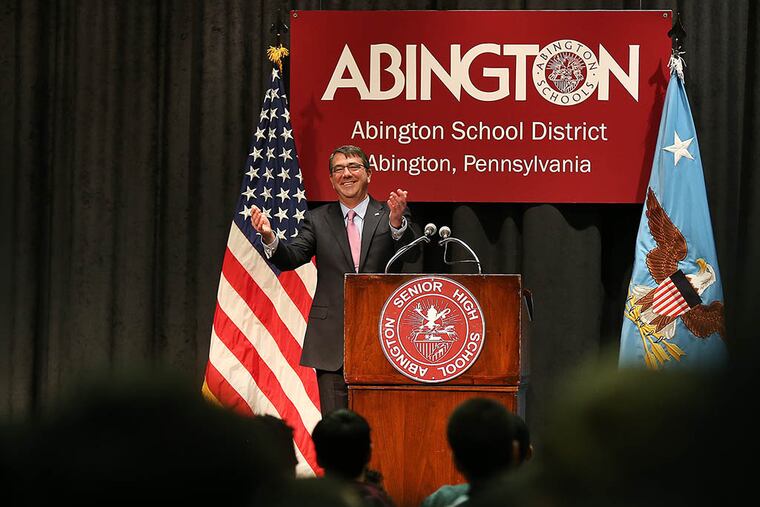At Montco HS, Defense Secretary touts 'force of the future'
Abington Senior High is in one of the nation's highest achieving school districts. Nearly 86 percent of its last graduating class went on to college.

Abington Senior High is in one of the nation's highest achieving school districts. Nearly 86 percent of its last graduating class went on to college.
But in the last 15 years, fewer than 2 percent of its graduates chose another path: the military.
On Monday, the school welcomed one of its most esteemed alumni, a man who hopes to change that imbalance not just at Abington, but nationwide.
"I used to sit right down there," said Defense Secretary Ashton Carter, smiling as nearly 1,000 students and educators welcomed him with a standing ovation.
Nodding toward the edge of the auditorium, Carter thanked some of his teachers and coaches - even James Gavaghan, the cross-country coach who decades ago would look at his stopwatch "and say, 'Carter, I don't even know why I use this. I should get a calendar for you.'"
Like most of the students before him, Carter chose university over the military. After decades as a physicist and academic, he made his way into national security and last month was confirmed as Secretary of Defense.
Modernizing the military workforce is one of his top priorities. To that end, he made Abington High, about 17 miles north of Center City, the first stop on a national "Force of the Future" recruitment tour.
Our service members "are not just defending our country against terrorists in places like Afghanistan and Syria and Iraq," Carter said, encouraging students to think beyond the traditional combat image. "They're helping to defend cyberspace. ... They're working with cutting-edge technology like robotics and biomedical engineering. When disaster strikes, they deliver aid all over the world."
As the battleground shifts, he said, roles for the military grow more diverse and more technical, and the need for well-trained professionals grows.
The "so-called 9/11 generation" that signed up in the wake of the terror attacks is starting to leave the ranks. The Pentagon now needs 250,000 new recruits every year to keep pace.
To make the service more accessible and attractive compared with the private sector, Carter said, the Pentagon should consider avenues for civil service, consider how Facebook and Netflix-type algorithms might be useful in revamping the military's merit and rank structure, and expand opportunities for mid-career professionals to enlist.
"Anyone willing and able to serve their country should have a full opportunity to do so," he said.
Carter called on the students to rethink their image of what a "military life" might entail.
"Movies like American Sniper, video games like Call of Duty, TV commercials with troops coming home ... images like that are only a slice of what our military does on a daily basis," he said. "Even now, on bases around the world, they're watching March Madness."
He spoke for nearly 30 minutes, and fielded questions for 10 more, standing alone on the auditorium stage. Not far away stood an easel with a red and gold Class of '72 banner. He arrived and left through a side door.
Carter made a few references to his own days at Abington, including a self-deprecating quip that he ended up playing lacrosse because he wasn't big enough for football, tall enough for basketball and only "reasonably coordinated."
Still, he was tops academically in his class of nearly 1,000 students, about twice the size of the school's current senior class.
Some current students said Carter's talk made them think about options later in life that they might not have considered.
"It's inspiring to hear from somebody who was in the same situation as we are now," said Sarah Donohue, a senior. "Even if we don't go into the military, there are other paths we can take to serve our country."
Michael Alvaro, a senior planning to study biomedical engineering at Columbia University, said he was intrigued by how Carter shifted his career from science into public service. "To think that my research could be something beneficial to this country is amazing," Alvaro said.
The secretary also answered questions from students about his time at Abington, how his studies in physics translated to the Pentagon, and about some of the biggest challenges he will face as defense secretary.
Rebecca Kruger, the editor of the high school's paper, firmly but respectfully asked about sexual assaults, noting that although the military "is more tolerant and diverse than ever," it has "a history of pervasive misogyny."
Carter said the nature of military deployment can "create opportunities for predators" but said sexual assaults undermine the mission of an organization that is supposed to be based on honor and trust.
"We have to completely defeat this," he said, but did not give any specifics for how he would go about doing that.
Asked if he would support sending combat troops to fight ISIS in Syria or Iraq, Carter said he would continue to provide assistance to a ground force - but that he is not inclined to send in our own.
"At the end, someone has to defend the peace on the ground. And that can't be us, because it's not our country," he said.